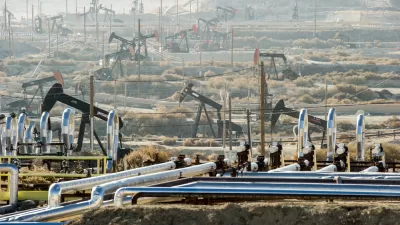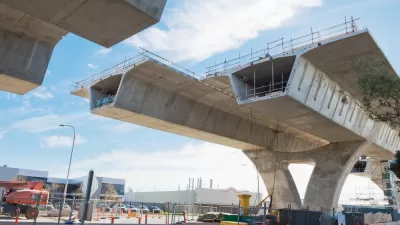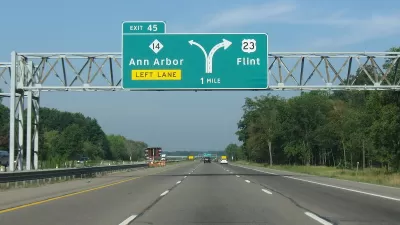The Michigan Department of Transportation will start a $1 billion, 14-year construction project later this year, on I-75, north of Detroit. Some community members are still wondering if the project is necessary.
Eric. D. Lawrence reports on the looming plans to widen the I-75 freeway outside of Detroit. "The project will modernize interchanges, replace all vehicle and pedestrian bridges and add a lane north and south to be used for carpooling during rush hour and regular traffic at other times," according to Lawrence.
Much of the focus of the article is devoted to the lingering questions about the wisdom of the 14-year, $1 billion project:
The initial reaction to the project has been mixed. Some are pleased that a major highway with obvious signs of wear and tear over the past five decades is finally getting rebuilt. Others suggest widening the more than 17-mile route from Auburn Hills to Hazel Park is an outdated approach to regional planning that would divert attention and resources from public transit.
The article includes soundbites from opponents to the project as well as the Michigan Department of Transportation. The latter insists the project is a "fix-it-first" project. Lawrence also devotes attention to the construction schedule, which splits the project into eight separate sections, and the funding allocations. The federal government is funding 80 percent of the final bill for the project. But most of the article's in-depth coverage details the political conversation occurring in response to the project.
FULL STORY: I-75: Mixed feelings on the $1B project

Alabama: Trump Terminates Settlements for Black Communities Harmed By Raw Sewage
Trump deemed the landmark civil rights agreement “illegal DEI and environmental justice policy.”

Study: Maui’s Plan to Convert Vacation Rentals to Long-Term Housing Could Cause Nearly $1 Billion Economic Loss
The plan would reduce visitor accommodation by 25% resulting in 1,900 jobs lost.

Planetizen Federal Action Tracker
A weekly monitor of how Trump’s orders and actions are impacting planners and planning in America.

DC Extends Application Window for Outdoor Dining Permits
District restaurants will have until the end of November to apply, but businesses with permits in rush hour parking lanes must end operations on July 31.

Wind Energy on the Rise Despite Federal Policy Reversal
The Trump administration is revoking federal support for renewable energy, but demand for new projects continues unabated.

Passengers Flock to Caltrain After Electrification
The new electric trains are running faster and more reliably, leading to strong ridership growth on the Bay Area rail system.
Urban Design for Planners 1: Software Tools
This six-course series explores essential urban design concepts using open source software and equips planners with the tools they need to participate fully in the urban design process.
Planning for Universal Design
Learn the tools for implementing Universal Design in planning regulations.
Caltrans
Smith Gee Studio
Institute for Housing and Urban Development Studies (IHS)
City of Grandview
Harvard GSD Executive Education
Toledo-Lucas County Plan Commissions
Salt Lake City
NYU Wagner Graduate School of Public Service





























